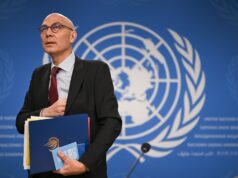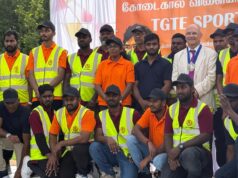Over 200 British Tamils staged a demonstration opposite of Number 10, Downing Street on 23 July 2016, in remembrance of 1983 Black July massacre. This was organised by the Tamil Coordinating Committee (TCC) and the Transnational Government of Tamil Eelam (TGTE).
Mr. L. Dheivendran, a young Tamil activist, who was part of the organising committee of this event, delivered a speech to raise awareness of this event and called for justice for the crimes committed  over several decades. He himself is a direct victim of ethnic riots stated; “Today is one of the most darkest days in the history of Tamils in Sri Lanka. On this day, 25th July 1983 – Tamil Prisoners were brutally massacred by the Singhalese in the cruellest manner. Mr Sellarasa “Kuttimani” Yogachandiran, leader of the Tamil Eelam Liberation Organisation (TELO) and Ganeshanathan Jeganathan, a political writer, had their eyes gouged out in mockery before being killed by Sinhalese inmates at the high security Welikada prison in Colombo. A total of 37 Tamil prisoners were murdered the same day, and 18 more were killed two days later. Over the course of 7 days in July 1983, an indeterminable number of Tamils died or were displaced by targeted, state-sponsored violence. To date, Sri Lanka has not launched a criminal investigation into the pogrom nor made any effort to bring perpetrators to justice”
over several decades. He himself is a direct victim of ethnic riots stated; “Today is one of the most darkest days in the history of Tamils in Sri Lanka. On this day, 25th July 1983 – Tamil Prisoners were brutally massacred by the Singhalese in the cruellest manner. Mr Sellarasa “Kuttimani” Yogachandiran, leader of the Tamil Eelam Liberation Organisation (TELO) and Ganeshanathan Jeganathan, a political writer, had their eyes gouged out in mockery before being killed by Sinhalese inmates at the high security Welikada prison in Colombo. A total of 37 Tamil prisoners were murdered the same day, and 18 more were killed two days later. Over the course of 7 days in July 1983, an indeterminable number of Tamils died or were displaced by targeted, state-sponsored violence. To date, Sri Lanka has not launched a criminal investigation into the pogrom nor made any effort to bring perpetrators to justice”
Mrs Vasanthakumary Chandrabalan, a former Assistant Director of Education and the Sports Committee member of  the LTTE, who was leading this event, told the media; 2016 marks a special year to remember this dark episode of the early conflict. During the June UNHRC session in Geneva, the Sri Lankan Foreign Minister, Mangala Samaraweera, recognised the need to investigate criminal liability for genocide arising from the Sri Lanka’s ethnic conflict in the wake of evidence relating to the use of cluster munitions in the No Fire Zones. Their use has been expressly banned by the Convention medicament cialis generique on Cluster Munitions (2008) and use against a civilian population could constitute a war crime. I was present in the war zone in 2008/2009 and I am an eye-witness to the use of Cluster Munitions by the Sri Lankan army. I am prepared to give evidence in any international Court and the Sri Lankan Government must be prosecuted”
the LTTE, who was leading this event, told the media; 2016 marks a special year to remember this dark episode of the early conflict. During the June UNHRC session in Geneva, the Sri Lankan Foreign Minister, Mangala Samaraweera, recognised the need to investigate criminal liability for genocide arising from the Sri Lanka’s ethnic conflict in the wake of evidence relating to the use of cluster munitions in the No Fire Zones. Their use has been expressly banned by the Convention medicament cialis generique on Cluster Munitions (2008) and use against a civilian population could constitute a war crime. I was present in the war zone in 2008/2009 and I am an eye-witness to the use of Cluster Munitions by the Sri Lankan army. I am prepared to give evidence in any international Court and the Sri Lankan Government must be prosecuted”
Mrs Meloni Dissanayake, a Human Rights Lawyer from Sri Lanka who is currently volunteering with the International Centre for Prevention and Prosecution of Genocide (ICPPG) stated in her speech, “Any investigation into Genocide must  include the events of Black July. Despite being decades apart, both episodes possess hallmarks of latent Genocidal intent: the victims were Tamil civilians, proximate Tamil groups were attacked and the state propagated the situation. It is advanced that these hallmarks indicate a deliberate targeting and destruction of proximate Tamil communities by the state. Therefore, in light of these similarities, an investigation into May 2009 warrants an investigation into Black July. Determining any potential criminal liability for Genocide is a considerable milestone in Sri Lanka’s post-war conflict resolution”.
include the events of Black July. Despite being decades apart, both episodes possess hallmarks of latent Genocidal intent: the victims were Tamil civilians, proximate Tamil groups were attacked and the state propagated the situation. It is advanced that these hallmarks indicate a deliberate targeting and destruction of proximate Tamil communities by the state. Therefore, in light of these similarities, an investigation into May 2009 warrants an investigation into Black July. Determining any potential criminal liability for Genocide is a considerable milestone in Sri Lanka’s post-war conflict resolution”.
Miss Rubini Kanagaranjithan, another prominent TGTE volunteer expressed her  disappointment that “it should not have taken the use of cluster munitions to reignite the call for criminal responsibility. Criminal investigations are a step in the right direction, however, much more is needed to achieve truth, justice and reconciliation. Ultimately, this journey will only conclude with the punishment of the senior figures responsible for all, including historical, mass atrocities associated to Sri Lanka’s ethnic conflict and grant of a separate Independent state for the Tamils which is Tamil Eelam”
disappointment that “it should not have taken the use of cluster munitions to reignite the call for criminal responsibility. Criminal investigations are a step in the right direction, however, much more is needed to achieve truth, justice and reconciliation. Ultimately, this journey will only conclude with the punishment of the senior figures responsible for all, including historical, mass atrocities associated to Sri Lanka’s ethnic conflict and grant of a separate Independent state for the Tamils which is Tamil Eelam”
Mr Sabaratnam Subakaran, an active TGTE volunteer, leading this event with a Tiger flag in his hand passionately told, “Tamil Eelam is the thrust of Tamils. Both my sister and I were former members of the LTTE and we contributed to the freedom struggle of the LTTE in the past. The world
collaborated with the Sri Lankan Government and betrayed us by defeating the LTTE who were our only guardians. Now we have no protection. I was detained and tortured in 2013 by the Sri Lankan forces. The
world has let us down and no justice is given to us yet. We will continue our fight for freedom by political ways until the last breath”.
 The placards and banners that highlighted the on-going genocide of the Tamils in the North-East of Sri Lanka displayed to the public that the events of Black July were a small fragment of the unabated destruction faced by the Tamil nation in the North-East.
The placards and banners that highlighted the on-going genocide of the Tamils in the North-East of Sri Lanka displayed to the public that the events of Black July were a small fragment of the unabated destruction faced by the Tamil nation in the North-East.
Significant interest was shown by people passing the demonstration, who stopped to ask further questions about the current situation in Sri Lanka. Many were taken aback to find that Tamils were
yet to receive justice for the numerous massacres they had been subjected to, and that the destruction of the Tamil nation continued today.








